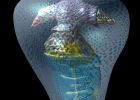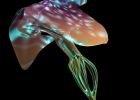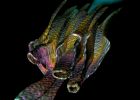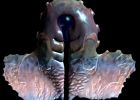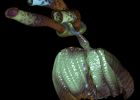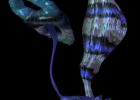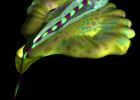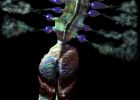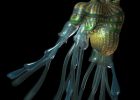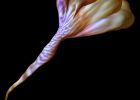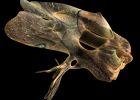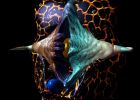Flusser Studies 04 - May 2007 / Thematic focus: Louis Bec
3. Vilém Flusser 1920 / 1991
This text tells the story of a long and productive friendship: the first encounters between Flusser and Bec, their ritualized Saturday afternoon conversations, their common interests. It also tells the story of their trip to Prague in 1986. The text ends with a description of Bec’s and Flusser’s most important project – Vampyroteuthis infernalis (1987) – thereby introducing the reader to the following two essays.
Les gestes prolongés. Postface
Bec explores the significance of gestures in Flusser’s work, linking them to Flusser’s writing activity as well as to Flusser himself. Through his gestures, his gesticulating, he moved to move others. The world manifests itself in gestures. New gestures may appear, influencing and changing how we relate to reality. The new gestures of photographing, filming, and videotaping will alter our ways of existence in that they anticipate a new cybernetic form of life.
Vampyroteuthis infernalis. Postscriptum
Vampyroteuthis infernalis is perhaps the most important, certainly the most public, result of Bec’s and Flusser’s collaboration that lasted for more than fifteen years. Bec here presents the starting points of the publication and what the different zoosystemic plates included were supposed to signal. Each one of the abysmal creatures invented by Bec is supposed to mirror a different aspect of Flusser’s thinking.
Deception and the “Magic” of “Technical Images” According to Flusser
Flusser’s theory of communication addresses the modern images – “technical images” – in the context of a general theory of deception generated by the different communication codes. “Technical images,” as the dominant communication code, imply, according to Flusser, a retrieval of magical forms of consciousness. Such a retrieval seems to be necessary as a result of that what McLuhan would term the overheating of the alphabet technology: lineal codes in their most salient form, namely scientific texts, do not offer any existential meaning, requiring a reversal to magical consciousness fostered by images.
The Camera That Ate Itself
This text starts from Flusser’s description of the camera as an ‘apparatus’. Working with John Hilliard’s series of photographs A Camera Recording Its Own Condition (7 apertures, 10 speeds, 2 mirrors) a number of developments of the idea of the apparatus are made. The text discusses medial will to power, Marxist theories of the machinic, and conceptual art’s exploration of the materiality of informational systems. It draws upon reflexivity in Flusser’s formulation of the apparatus, in cybernetics, and in Foucault’s Nietzschean theories of knowledge.
